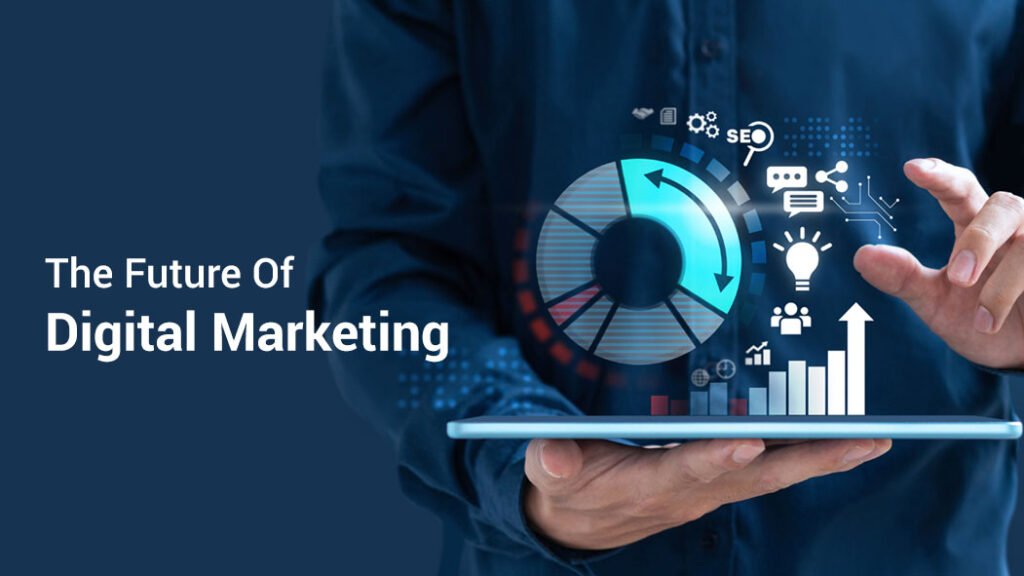Businesses must keep ahead of the curve to stay competitive in the ever changing world of digital marketing. With new digital platforms, changing consumer behavior, and technological breakthroughs, 2025 holds great prospects for brands that are flexible. The main tactics and trends that will influence digital marketing in the upcoming year are listed below.

Automation & Digital Marketing Driven by AI
Artificial Intelligence (AI) is becoming a requirement rather than a sci-fi idea. AI-powered solutions like ChatGPT, Jasper, and Midjourney are revolutionizing advertising, consumer interaction, and content production. AI is being used by businesses to automate chatbot responses, optimize ad targeting, and monitor customer behavior.
First-Party Data & Privacy-Focused Digital Marketing’s Ascent
Businesses must concentrate on gathering first-party data through direct client interactions as third-party cookies become less relevant. Data collecting will heavily rely on tactics like value-driven gated content, interactive content (such as surveys, polls, and quizzes), and email subscriptions. To gain the trust of consumers, organizations must also make sure that privacy rules like the CCPA and GDPR are followed.
Conversational Marketing & Voice Search
For search inquiries, more customers are turning to voice assistants like Google Assistant, Alexa, and Siri. Because of this change, marketers must concentrate on conversational terms, long-tail keywords, and natural language when optimizing content for voice search. Additionally, by offering immediate, round-the-clock assistance, AI chatbots and messaging apps are transforming customer care.
Short-Form Video Content’s Dominance
One of the most captivating content formats is still video marketing, and short-form videos are becoming increasingly popular. High engagement rates are being driven by platforms such as YouTube Shorts, Instagram Reels, and TikTok. Brands should concentrate on producing genuine, engaging, and educational videos that engage their audience if they want to thrive.
Immersive and Interactive Content
Brands are reacting to consumer demand for interactive experiences by creating immersive content such as virtual reality (VR) and augmented reality (AR). Immersion marketing is changing how consumers interact with brands, from 360-degree experiences in real estate and tourism to virtual try-ons for eCommerce companies. Companies will build stronger relationships with their audience if they invest in interactive content.
Behavioral targeting and hyper-personalization
Customers of today anticipate that brands will be aware of their wants and needs. Businesses can provide individualized email campaigns, personalized recommendations, and dynamic website content based on user behavior with the use of AI-driven personalization. Personalization will increase engagement and conversion rates for businesses.
User-generated content and community-driven marketing
Customers have greater faith in other customers than in conventional advertising. Companies will have a greater effect on their audience if they create vibrant communities and support user-generated content (UGC). Brands may build authenticity and trust by encouraging consumers to post reviews, testimonials, and firsthand accounts on social media.
The Evolution of Social Commerce and Influencer Marketing
Social media sites are developing into popular places to shop. Direct purchases are becoming more convenient for customers because to features like Facebook Marketplace, Instagram Shops, and TikTok Shopping. Furthermore, micro-influencers are becoming more popular in influencer marketing since they provide greater authenticity and engagement than famous endorsements.
Smooth Customer Experiences & Omnichannel Marketing
Consumers engage with companies on a variety of platforms, therefore a smooth cross-channel experience is essential. Businesses need to make sure that their messaging, branding, and customer service are consistent across all platforms, including social media, email, websites, and in-store interactions. Customers are more satisfied and loyal when firms use omnichannel marketing to give them a cohesive experience.
Search Generative Experience (SGE) & AI-Powered SEO
AI-generated replies from Google’s Search Generative Experience (SGE) are transforming search results. This implies that companies need to optimize their content for authoritative information, structured data, and conversational searches. High-quality content is more crucial than ever since traditional SEO tactics must change to adapt to AI-driven search engines.

Concluding remarks
With technology and customer expectations driving innovation, digital marketing has an exciting future. In 2025, companies that use AI, customization, interactive content, and community-driven tactics will rule the digital market. The secret to long-term success will be remaining flexible and customer-focused as trends continue to change.
Are you prepared to make your digital marketing plan future-proof? Stay ahead of the competition by putting these trends into practice right now!